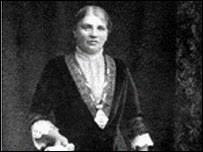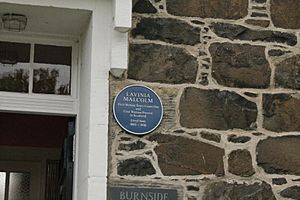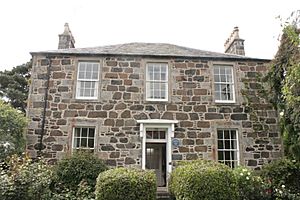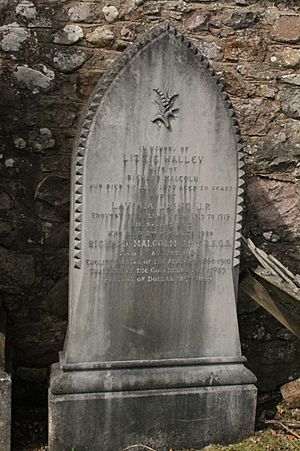Lavinia Malcolm facts for kids
Quick facts for kids
Lavinia Malcolm
|
|
|---|---|

Lord Provost of Dollar in 1913
|
|
| Born |
Lavinia Laing
ca. 1847 Forres, Scotland
|
| Died | 2 November 1920 (aged 72–73) Dollar, Scotland
|
| Nationality | Scottish |
| Known for | first woman councillor in Scotland first woman Lord Provost in Scotland suffragist |
Lavinia Malcolm (born Lavinia Laing around 1847 – died November 2, 1920) was an important Scottish woman. She was a suffragist, meaning she believed women should have the right to vote. She also became a local politician. Lavinia made history as the first Scottish woman to be elected to a local council in 1907. Later, in 1913, she became the first female Provost (like a mayor) in Scotland, leading the town of Dollar, Clackmannanshire.
Contents
Lavinia Malcolm's Early Life
Lavinia Laing was born in Forres, a town in Scotland. Her father owned a shop that sold metal goods, and he was also a local councillor (someone elected to help run a town). Her grandfather had also been a Provost of Forres.
Lavinia became a teacher in Edinburgh. In 1875, she was listed as a "teacher of drawing" in Edinburgh's New Town.
Moving to Dollar
Lavinia visited Dollar Institution (now called Dollar Academy). There, she met Richard Malcolm, an English teacher. Richard was married at the time, but after his wife passed away in 1878, Lavinia and Richard married.
After they married, Lavinia moved to Dollar. They lived in a house called Burnside House. The Malcolms also hosted students from the school in their home. Sadly, their son, Richard, died when he was only eight years old. After this, both Lavinia and Richard became involved in local politics. Richard became Provost first, from 1896 to 1899.
Becoming a Leader in Dollar
In 1907, Lavinia Malcolm was elected to the local council in Dollar. She was the only woman elected at that time. She was so respected that she was elected without anyone running against her. Then, in 1913, all the other councillors voted for her to become the Provost of Dollar. This made her the first female Provost in Scotland.
Lavinia was also a member of the local School Board and the Parish Council. People she worked with praised her. The head of the School Board said she was "a most valuable assistant." The head of the Parish Council said they "could not get on very well without her."
Fighting for Women's Rights
Lavinia Malcolm was one of the first women in the UK to lead a town council before 1914. Other pioneering women included Elizabeth Garrett Anderson (Aldeburgh, 1908) and Sarah Lees (Oldham, 1910).
The Dollar community website calls her the 'most famous' Provost. Janet Carolan, a museum curator, said that Lavinia "wanted women to have the vote but she was against doing anything militant or violent." This shows she supported women's rights through peaceful means.
During the First World War, Lavinia continued to serve as Provost. She was also one of the first women to attend the national Convention of Scottish Burghs (a meeting of Scottish town leaders). She was also one of the first women to be appointed as a Justice of the Peace, which meant she could help with legal matters.
She worked hard to reduce infant mortality (babies dying young). She also tried to fix problems like poverty and poor sanitation (unclean conditions) that caused health issues.
Lavinia Malcolm passed away in Dollar on November 2, 1920. She is buried in the Dollar churchyard, near her home.
Her Lasting Legacy
Lavinia Malcolm knew that she was setting an example for other women. She showed that women could be leaders and make a difference in their communities.
In 2007, 100 years after Lavinia Malcolm was first elected, politicians in Scotland remembered her. Keith Brown and Sarah Boyack, who were both Members of the Scottish Parliament (MSPs), spoke about Lavinia's example. They noted that:
- There were 262 women councillors in Scotland, making up 20% of the total.
- There were 43 women MSPs, making up a third of the total.
Sarah Boyack said she hoped to see equal numbers of women and men in politics. She wanted more women in local government to share a woman's view on things.
Ten years later, in 2017, the number of women in Scottish politics had grown even more. Women made up 29% of councillors and 35% of MSPs in the Scottish Parliament. Lavinia Malcolm's pioneering work helped pave the way for these changes.
 | Valerie Thomas |
 | Frederick McKinley Jones |
 | George Edward Alcorn Jr. |
 | Thomas Mensah |




